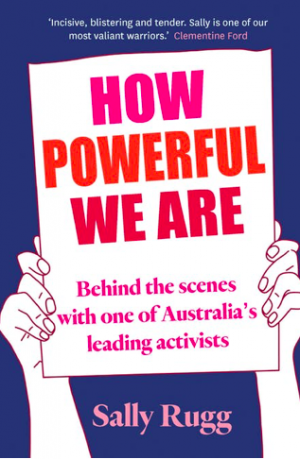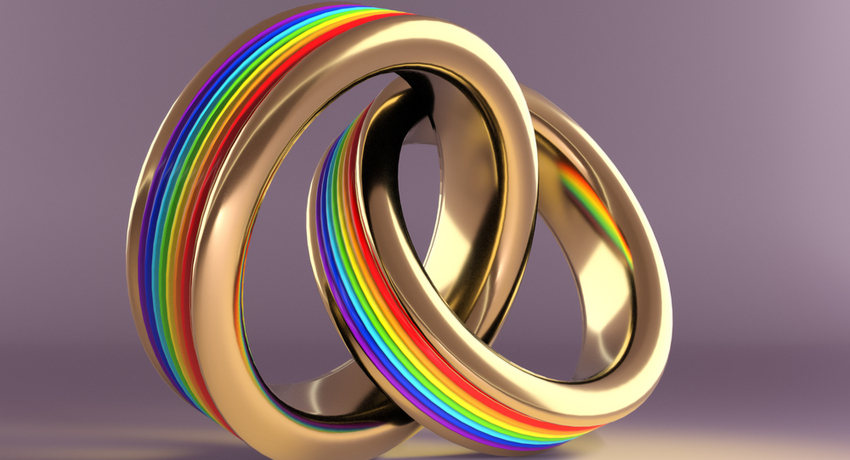It is not a secret that Sally Rugg did not initially believe that LGBTIQ Australians (and allies) should invest their energy in marriage equality. Describing marriage as a sham, “weird and naff and dated”, and not wishing to be married herself, she believed that the effort put towards marriage equality may detract from other LGBTIQ interests and concerns – namely inclusion, isolation and disadvantage. Rugg has since changed her mind on this of course. Marriage is not just for heterosexuals, and being locked out of marriage is disadvantage, discrimination and socially and emotionally isolating.
In How Powerful We Are (HPWA), Rugg weaves a sophisticated timeline spanning the marriage equality campaign in Australia, the years leading up to the postal vote, the advocacy, debates, delay tactics and political deals; the two months in 2017 when Australians had their say, voluntarily in Yes/No boxes, in rallies, on phone lines, TV, radio and in the comments sections; to now, its successes and repercussions. She discusses the shared burden of the LGBTIQ community, the histories collectively reflected upon and violences suffered. Carefully and tenderly, she recounts stories of love – love refused legitimacy under the law, love denied, and love celebrated.
 Rugg’s passion for the LGBTIQ community gleams brilliantly throughout the book. So too does her heartfelt appreciation to the multitude of volunteers, allies, advocates and activists who spurred the marriage equality campaign forward.
Rugg’s passion for the LGBTIQ community gleams brilliantly throughout the book. So too does her heartfelt appreciation to the multitude of volunteers, allies, advocates and activists who spurred the marriage equality campaign forward.
But while the book unfailingly celebrates LGBTIQ activists and allies, Rugg too admits to the shortcomings of the Yes campaign. Hard choices were made in the name of securing as many (voluntary) ‘Yes’ votes as possible. The campaign tended to favour cis-gendered, white voices, further side-lining the already marginalised. It distanced itself from activism attempting to dismantle and disrupt the No campaign, and avoided addressing important LGBTIQ issues that may have cost votes. Rugg worries about what these decisions did to her personally throughout the campaign, and how they continue to affect her, and the LGBTIQ community.
What is obvious, however, is her passion for activism and campaigning, and storytelling for change. HPWA is in part a homage to a social movement founded on equality, and in part driven by her refusal to allow the efforts of everyday LGBTIQ heroes and allies to be forgotten under the weight of story re-writes and political back-patting.
The Yes campaign was one of the best demonstrations of syndicated polygonal campaigning and advocacy in recent Australian history
The Yes campaign was one of the best demonstrations of syndicated polygonal campaigning and advocacy in recent Australian history – everyday activism meeting specialised expert campaigning, cooperative media finessing, and (allied) political acrobatics. So, it is with no small amount of apprehension that Rugg also calls out the inequalities and mistreatment that can exist within activist spaces, particularly for women.
Rugg has already spoken publicly about how she was bullied, and the “hard criticism” she received from (in particular) male activists within the marriage equality campaign. This admission is a small part of HPWA, but not insignificant. “Bullying and harassment” Rugg writes:
thrives when the people who are put in leadership positions are allowed bad behaviour because they’re doing ‘good work’. It thrives in sectors where young women in particular are so committed to the work that they’ll take the shit that’s thrown at them every day in the desperate hope of contributing as an activist.
Harassment steeped in sexism is complex, exists across industries, goes underreported, can be overt and tied to other forms of discrimination. Rugg briefly discusses how sexism and bullying, dominance and systemic gendered-inequities, exist even within equality-based movements and groups. Without a doubt, such groups should always call out bad behaviour as acting otherwise allows safe spaces for perpetrators and relegates victims to silos of shame and silence.

No one should hesitate to investigate cruelty or ignore toxic workplaces out of a concern for saving-face and safe guarding funding and public support. Campaigners and activists (paid or volunteering) should not have to ask themselves whether the cause is inherently more important than their own wellbeing. Rugg’s very careful recognition of this issue is admirable and brave.
In an age where vitriolic and regressive opinions are given equal weight and platforming to messages of inclusivity and change in the name of ‘balance’ … how do we dismantle the socio-political echo chambers that divide us to enable critical discussions for inclusion, growth and empathy?
A question emerges reading the book: as advocates of equality, what lessons can we adopt from those learned during the Yes campaign? In an age where vitriolic and regressive opinions are given equal weight and platforming to messages of inclusivity and change in the name of ‘balance’, where audiences pigeonhole their reading to “smaller bubbles of ideas”, led by sensationalism and clicks, just how do we dismantle the socio-political echo chambers that divide us to enable critical discussions for inclusion, growth and empathy? How do we stop ourselves from falling into the same traps and patterns of confinement, potentially “inflam[ing] prejudices and misconceptions, instead of promoting public-spirited ways of determining the common good”. As gender advocates, how do we halt the backlash, the gender fatigue, and the pushback on women’s rights?
Rugg writes with anger, cheek, sarcasm, and grief, but what lingers is her compassion. There may never be the right campaign frame/message to sway those who “think LGBTIQ people don’t and shouldn’t exist”. Rugg herself is under no illusions that you can convince everyone of your cause. While one might wish that the objectors read her book and engaged with it, it will likely never happen.
This book is for those who followed the campaign, who believe in equal rights, for whom the campaign outcome meant so much, and for those who did not see themselves reflected in the Yes imagery, but should have. It is for those who want to know how campaigns can be fought, how they can be strengthened even when they feel frayed. It is for the activists and advocates amongst us. It is for those who want to read about how effective campaigns plough forward, with confrontation and compromise, missteps and successes, undeterred, rebellious, and proud.




